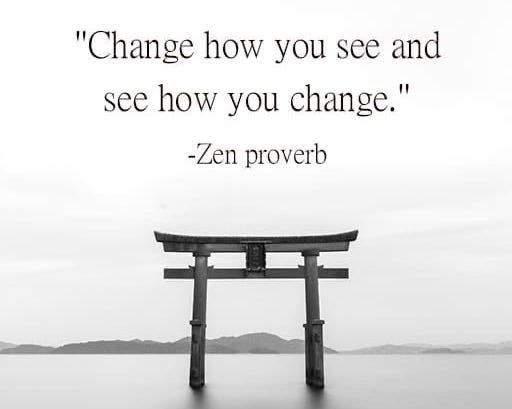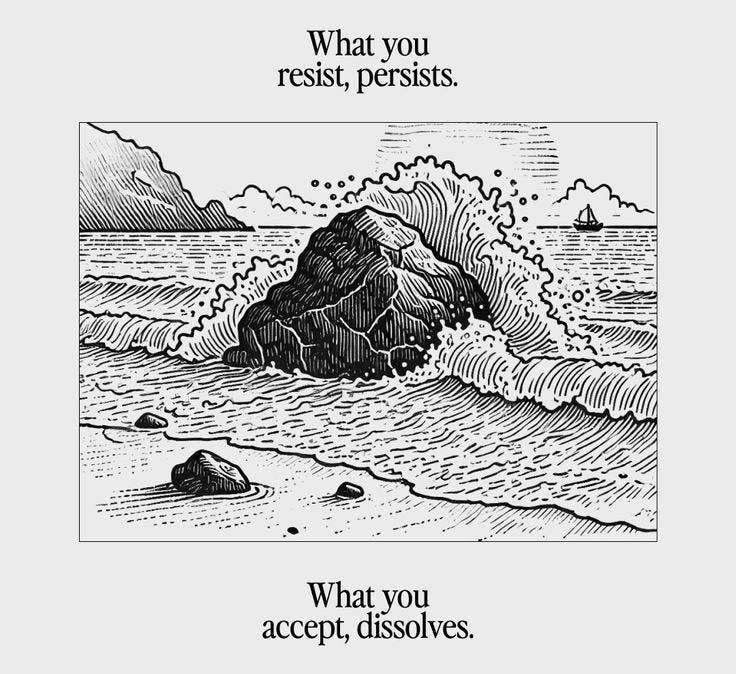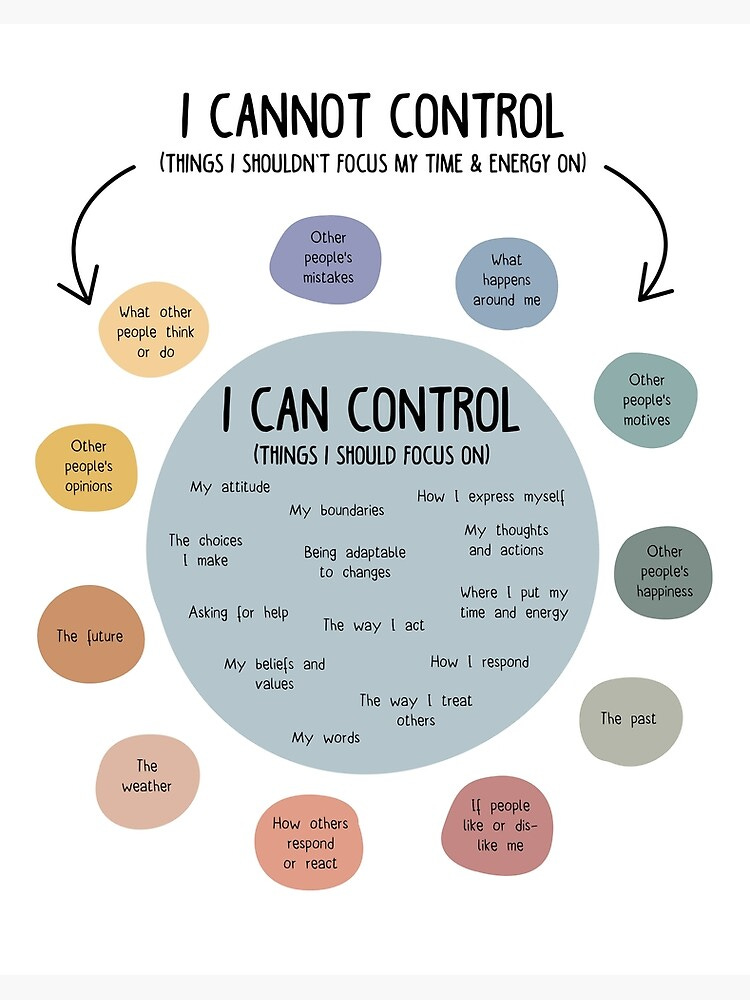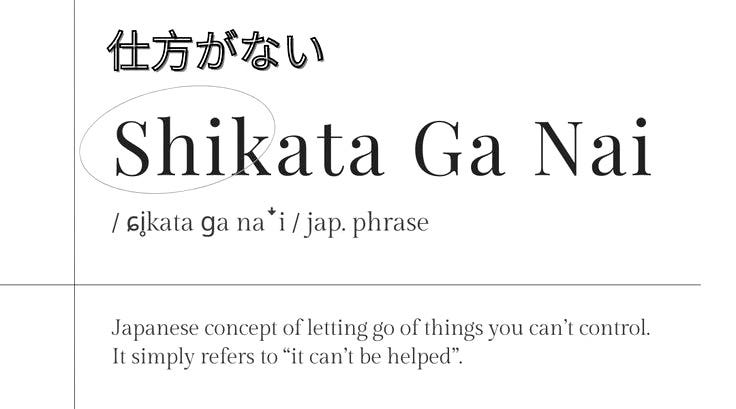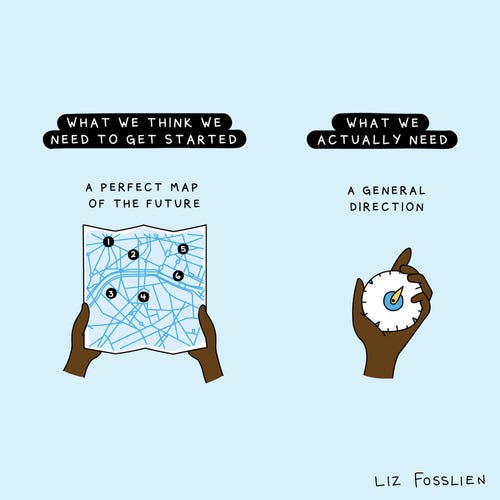Shifting Focus: A Journey of Acceptance and Growth
How can a small change make a big difference.
Shifting focus isn't about ignoring reality—it's about directing your attention to what you can change.
As Haruki Murakami once said: "Pain is inevitable, but suffering is optional."
Often, when things fall apart, it's not a curse but a call—a signal to shift, adapt, and grow. But before stepping forward, there are two essential truths to reflect on:
1. Acceptance of what is.
2. Understanding what lies within your control.
Acceptance doesn’t mean passivity. Recognizing a bad habit doesn’t imply it can’t be replaced or reformed. On the contrary, denying reality only makes it persist with greater force.
Imagine standing in a forest with a lion ready to attack. Pretending it’s not there won’t make it disappear. Similarly, suppressing emotions or distractions doesn’t resolve them. Instead, sit with your feelings—listen without judgment, without expectation.
Accept things as they are, not because they're ideal, but because they are. Acknowledgment is the first step toward transformation. As humans, we often deceive ourselves, relying on fleeting emotions and memories. Yet our bodies carry the truth, encoded in every cell, waiting to be heard. Ignore it, and it grows louder.
Denial grants power to the very thing we seek to avoid. Acceptance, however, liberates us. It allows us to look in the mirror and say:
"This is me—flawed yet beautiful. Sometimes strong, sometimes afraid. All that I’ve been through has led me here. From this point onward, I take responsibility for myself—for building my life, my way."
This is the beginning of reclaiming your power—the power to change, to grow, and to create.
Controlling the Controllables
After acceptance, clarity comes from focusing on what you can control and releasing what you cannot.
What you can control:
- Your boundaries with others.
- Your response to external behavior.
- Where your time and energy go.
- Your habits and actions.
- The influence you allow others to have over you.
- Forgiveness.
What you cannot control:
- Other people's boundaries.
- Time, the past, or the future.
- Others' emotions, words, or behaviors.
- How others perceive you.
- External events.
- Beliefs and perspectives of others.
Dwelling on the uncontrollable invites frustration, anxiety, and fear. It leaves us waiting for a savior—a stroke of luck or a person to fix things. These "if only" lies lead to endless dissatisfaction.
Instead, focus where your influence overlaps with what truly matters. That's where growth begins.
But when you finally find where you want to direct your attention, filled with energy and inspiration, suddenly you feel something weird, a fear that there’s nothing left to add to this world: VEMÖDALEN.
VEMÖDALEN: The Fear That Originality Is No Longer Possible

From The Dictionary of Obscure Sorrows by John Koenig:
"You are unique. And you are surrounded by billions of other people, just as unique as you. Each of us is different, with some new angle on the world. So what does it mean if the lives we’re busy shaping by hand all end up looking the same?"
We venture out, hoping to leave a mark, to create something special. Yet, when our efforts are placed side by side, they often seem eerily similar: the same sunsets, the same selfies, the same monuments pinched between fingers.
It should be comforting to realize we’re not so different. But it also raises a question: Is there any value left in repeating what’s already been done?
Still, perhaps originality isn’t about inventing the unseen but about contributing your unique voice to the timeless conversation. As the poet reminds us:
"The powerful play goes on, and you will contribute a verse. What else is there to say? When you get your cue, you say your line."
But what does it mean to "say your line"? Does it mean to create something truly unprecedented, or is it simply about expressing your unique self in a world teeming with imitation?
Authenticity: The Willful Art of Embracing Yourself
As Eric Hoffer aptly observed:
"When people are free to do as they please, they usually imitate each other."
Authenticity, then, is not the absence of external influence but a conscious rebellion against imitation. It’s about embracing your unique self despite the constraints and challenges life imposes.
Interestingly, it is often those very constraints—pain, struggles, and the problems we face—that become the catalysts for discovering our authentic selves. When viewed differently, pain can be seen not as an obstacle but as a guide. It pushes us to confront our fears, evaluate our values, and strip away the superficial layers that obscure who we truly are.
In this sense, pain acts as a refining fire, much like the Japanese art of kintsugi, where broken pottery is repaired with gold, making its flaws a defining feature of its beauty. Problems and hardships, though unwelcome, can be the forces that reshape us into something more resilient, compassionate, and uniquely ourselves.
To "say your line," as John Koenig puts it, requires shifting your perspective: seeing pain not as an end but as a beginning. It is through these challenges that we uncover the depths of our strength, creativity, and individuality. Authenticity is not merely about expressing who we are but about evolving into the best version of ourselves by leaning into discomfort and transforming it into growth.
To "say your line" is to create something deeply personal and meaningful—not in opposition to others but as a genuine expression of yourself. It’s about channeling your individuality into a purpose, something that adds value to the world.
Growth vs. Progress: A Matter of Perspective
As Mohammad Reza Shabanali aptly observed:
"In underdeveloped cultures, humans think about progress. In developed cultures, they focus on growth. Progress is measured by comparing oneself to others. Growth is about becoming productive alongside others. A cancer cell prioritizes its own progress over harmonious growth."
Progress often stems from comparison—a race against others. Growth, however, is an internal pursuit, rooted in collaboration and empathy.
Empathy bridges the gap between individual growth and collective harmony. Accepting others, even when their paths diverge from ours, is not an act of surrender but of strength. Differences exist to unite us in the most integrated way, not to divide us. As Einstein once said: Reality is an illusion, so we must not think that our perspective is the only truth out there. It’s a perspective, the way we perceive reality, not the reality itself.
The Power of Focus and Purpose
Everybody knows they're going to die, but nobody believes it.
-Tuesdays with Morrie by Mitch Albom
Denying mortality doesn’t make us immortal, nor delaying acceptance or change improve our circumstances. We have a limited time, let’s make it count.
As the saying goes:
"The cold water does not get warmer if you jump late."
Motivation is fleeting. Action rooted in purpose, however, creates lasting change. Whether others act or not, whether rewards are immediate or distant, if something matters to you, do it. The regret of inaction weighs far heavier than the risk of failure.
Let’s strive for fewer "what ifs" in our lives. As John Koenig beautifully wrote:
"When you receive your cue, you will say your line."
If you've felt the call but hesitated, remember this: you only live once. Your failures will fade, but what you create—what you give to the world—will endure.
Authenticity is not about perfection or conforming to societal expectations. It’s about embracing who you truly are, with all your strengths, flaws, and unique perspectives. As Eric Hoffer reminds us, in the absence of constraints, we often imitate others. But true authenticity is a conscious choice, a rebellion against the pressures to conform, and a commitment to live our lives as expressions of our most honest selves.
The challenges and pain we face in life are not just obstacles to overcome, but invitations to transform. When we shift our perspective on pain and problems, we can see them as the catalysts for growth, guiding us toward deeper self-awareness and authenticity. Just as broken pottery becomes more beautiful through the art of kintsugi, our struggles can shape us into more resilient, compassionate, and unique individuals.
So, what is your line to say? The world is waiting for you to contribute your verse, to step into your power, and to embrace your authentic self. Don’t let fear or doubt hold you back. Accept the challenges, embrace the discomfort, and remember that every step you take toward authenticity is a step toward growth, purpose, and transformation.
Today, choose to start living authentically. Choose by doing not just saying. Reflect on the areas of your life where you’re still imitating or holding back. Ask yourself: What would it look like if I embraced my true self, flaws and all? Shift your perspective on pain and challenges, and instead of seeing them as roadblocks, recognize them as opportunities for growth. Step forward with courage and purpose, and let your authentic voice be heard in the world. Don’t worry if you haven’t figured anything out, because no one does.
I have a simple exercise for when I feel lost and don’t know what to do, and I’ll share it here with you.
If you don’t know where to start or what to do, do this: 3 Cs
Choose, Challenge, Create/Continue
A. Choose one of the followings:
Something that you’re really curious about, and haven’t explored yet.
A pain or problem you deeply care about, and can’t stop thinking about it or it interferes with your/others’ daily lives.
Something that leads you to flow state, and it’s better if it contains creative energy.
B. Now, start a simple challenge or a small, 10-30 days project. Keep it simple.
For example, if you’ve always wondered about stars or secret animals in dark forests, start a new project: read articles or simple books, watch documentaries, ask people. And share what you learn with others. Capture your ideas and insights.
C. After finishing it, you’ll know the next step. Just trust your guts.
What you should note is that, if the thing you choose doesn’t make sense to you, it doesn’t mean they’re wrong. Most Wonderful things happen when you take unexpected actions. Best trips are the ones you haven’t completely planned. And the beauty of life’s journey is it’s always unpredictable.
In Azerbaijani we have a proverb: bulanmayınca durulmaz; which means the water will not be cleaned unless it becomes muddy at first.
So if everything is falling apart, and you don’t know what to do, remember this: bulanmayınca durulmaz; embrace the pain and shift your focus. Be courageous with following your inner voice, your heart knows the way.




